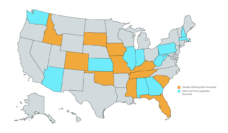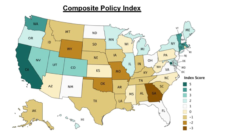Wearing a crisp suit with a crimson tie, Brandon Boulware presented himself as a proud Missourian, Christian, business lawyer, and father of a transgender daughter. He testified in the Missouri statehouse in March 2021 against a recent bill attempting to prohibit trans youth from competing in high school sports. Boulware said he didn’t allow his daughter to wear girl clothes in public or grow out her hair until he realized that he was teaching his daughter to deny who she is. “This language, if it becomes law,” Boulware cautioned, “will have real effects on real people.”
Anti-transgender policies are becoming dangerously prevalent. In 2021 alone, over 100 anti-transgender bills have been introduced. Such bills restrict transgender girls and women from entering female sports. Other policies attempt to prohibit trans youth from accessing gender-affirming health care, such as hormone therapy, puberty blockers, and surgeries. Gender-affirming health care can significantly decrease the risk of suicidality among this population.
Previous research suggests heightened mental health distress among the LGBTQ community, but most studies have focused on adults. The Trevor Project, a suicide prevention organization for trans youth, is one of the first to research the mental health impacts of the discrimination trans and non-binary youth experience. Their recent national study found that trans and non-binary youth ages 13 to 24 are two times more likely than cisgender and LGBQ youth to have experienced depression (83%), considered suicide (53%), and attempted suicide (29%) within the past 12 months.
Thirty-eight states have an anti-transgender bill circulating through state government, subjecting a majority of the US to policies that will jeopardize trans lives.
Trans and non-binary youth were physically threatened or harmed two times more frequently than their cisgender and LGBQ peers. The chronic stress caused by social marginalization further increases mental health distress. Young transgender men reported the highest rates of discrimination (92%), depression (86%), suicidal thoughts (62%), and suicide attempts (35%).
According to Freedom for All Americans Legislation Tracker, 22 states have introduced bills banning transgender health care by preventing medical professions from administering gender-affirming care to patients, while other policies limit access to gender-affirming care for people under 18 or 21 years of age. So far, 36 states have filed bills restricting trans youth participation in sports. Thirty-eight states have an anti-transgender bill circulating through state government, subjecting a majority of the US to policies that will jeopardize trans lives.
On April 5th, a month following Boulware’s testimony, Republican Governor of Arkansas, Asa Hutchinson, vetoed a bill that would have banned gender-affirming care for trans youth. He hoped his veto would urge conservative legislators to consider the “science and ethics surrounding the issue before acting.” The Arkansas legislature overturned his veto. Brandon Boulware’s testimony was also unsuccessful, as the Missouri anti-trans athlete bill was passed in the House in late April.
Given what we know about the mental health challenges trans youth face, we must consider the costs of anti-trans laws, costs to Brandon Boulware’s daughter, and millions of other real people.
Photo via Getty Images














